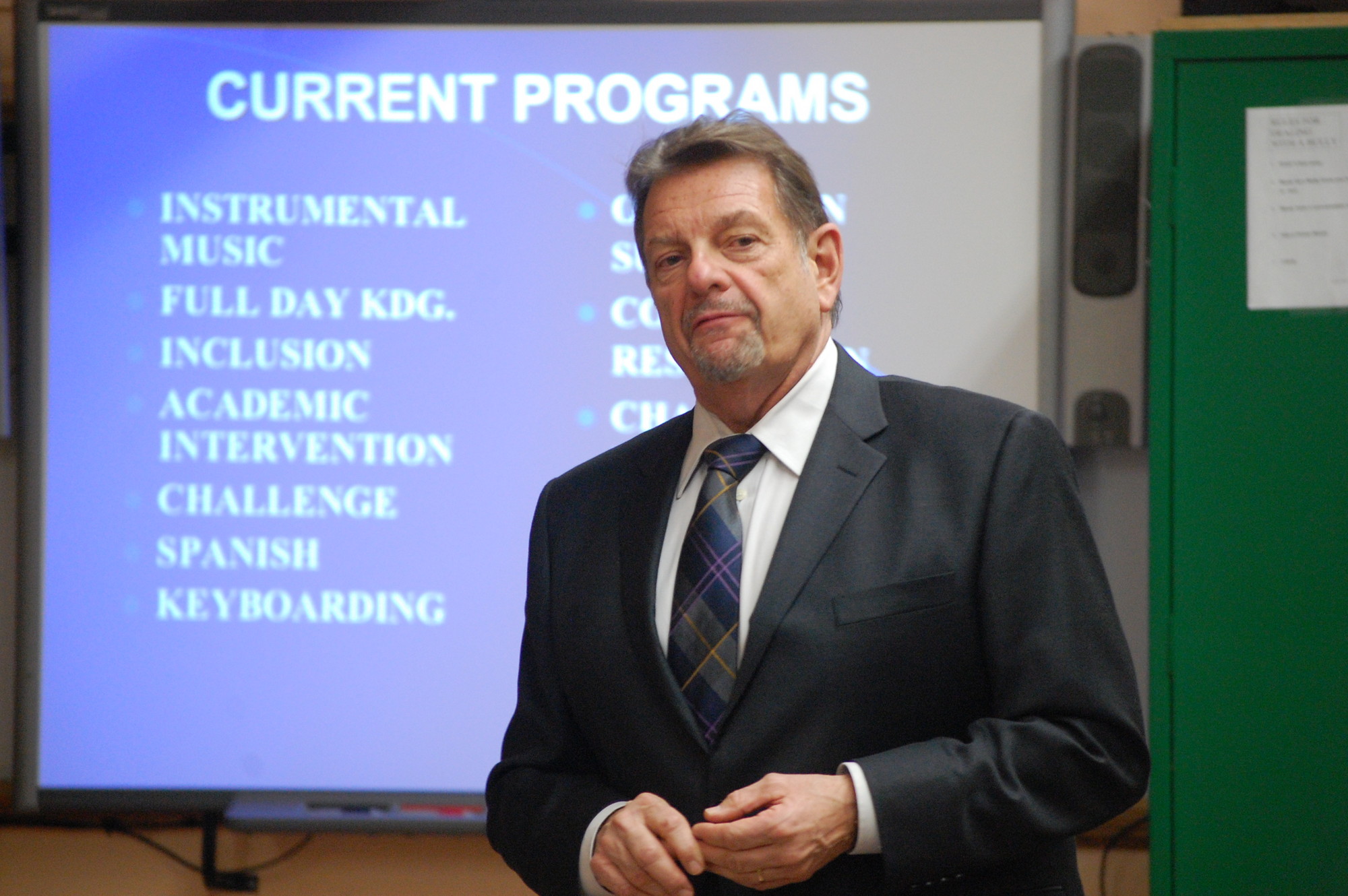District 24 revisiting Fale’s contract
Superintendent looking to retire, return at reduced salary
The District 24 Board of Education is nearing completion of a deal with Superintendent Dr. Edward Fale that would allow him to retire, yet keep working for the Valley Stream elementary district for another 3½ years.
The move, which school officials admit could create some negative public perception, is designed to save more than a half-million dollars over that time. Board of Education members say the deal is not final, and they want to hear from the public before they decide whether to approve it.
Under the agreement, Fale would retire on Jan. 1, and immediately be rehired under a new contract. Because he would begin collecting a pension, the district would pay him a reduced salary. The proposal calls for Fale to receive $130,000 per year, down from his current salary of $244,800.
In addition to $115,000 less in salary, the district would no longer have to pay pension costs for him, a savings of about $20,000 per year. An analysis Fale provided the Herald also shows a few thousand dollars in annual savings on Social Security taxes and health insurance costs.
Overall, Fale said, the deal would save about $570,000 over 3½ years. “This is something that’s perfectly legal to do,” said Fale, 65. New York state law places no restrictions on how much money someone 65 or older can earn even when collecting a state pension.
“All over, people are working after they’re retiring,” said Board of Education President Paul DePace.
Bob Lowry, a spokesman for the New York State Council of School Superintendents, said a deal like this is permissible for any public-sector retiree 65 or older. Retirees under that age, he said, are not allowed to return to the same or a similar job within a year of their retirement, unless they obtain a waiver from the state. “Once someone gets to age 65,” Lowry said, “they’re at what’s thought of as a conventional retirement age, and that’s why I think the law is what it is.”
Charles Fowler, president of School Leadership, which has conducted several superintendent searches on Long Island, said that situations like this are uncommon, but not unheard of. Fowler added that the State Legislature has worked to close some loopholes that allow people to return to the same job immediately after they retire.
Fale said he has thought a great deal about the proposal, and that he wants to continue working, and would rather do so in District 24, where he has been the superintendent since 1998, than go somewhere else. “I love the district,” he said. “I feel that there’s a special relationship that I have with the community.”
Retiring and coming back, he said, would give him the chance to stay while giving the district the chance to save money in tough financial times. He noted the rising costs for mandates such as retirement payments, health insurance and the implementation of the Common Core Learning Standards. There is also the state tax cap, which limits the amount districts can raise revenue each year.
The savings each year, Fale said, would be enough to preserve two teaching positions and ensure that programs can be maintained in District 24.
Fale’s current contract expires after the 2014-15 school year. If he retires on Jan. 1, his pension would be about $160,000 per year.
Deals like this, often referred to as “double dipping,” have been criticized by the public and elected officials alike in recent years. Fale and DePace acknowledge that such a deal could create a negative perception.
“We’re trying to get it out there so the public doesn’t think we’re trying to do this quickly,” said DePace, adding that board members would not approve the deal until the Nov. 20 board meeting, at the earliest.
“It’s a good opportunity to save money,” he said. “We’re still in discussions.”
Is it double dipping?
Lowry said that double dipping is a sensitive topic, and he would advise District 24 to be as forthcoming about the deal as possible. To gain the support of the public, school officials must tout the financial benefits, which, Lowry said, appear to be significant, with two potential sources of savings.
“We understand that it can be controversial,” he said, “so it is important for districts and superintendents to be transparent about the arrangement and explain why it may be advantageous to the district.”
Fowler agreed that double dipping is viewed negatively by many, but he pointed out that when someone collects a pension, he is getting money that has already been earned. It is not an additional cost to taxpayers, and people earning pensions often come back and work for salaries that save money.
Al Marlin, a spokesman for the New York State School Boards Association, said that a deal like this appears to be rare. It is much more common, he said, for retired superintendents to take interim posts in districts seeking new leaders.
Fale said that the salary was set at $130,000 because it is comparable to what a principal makes. He also noted that by staying for at least three more years, it gives the district plenty of time to find a successor, and could provide the opportunity for an internal candidate to emerge.
DePace said he believes residents will support the plan when they see the numbers and know they will be getting stable leadership in the district. “Dr. Fale has done a good job,” he said, “and the board has been satisfied.”
The Board of Education will hold its next public meeting on Wednesday, Nov. 20, at 8:30 p.m., at the William L. Buck School.






